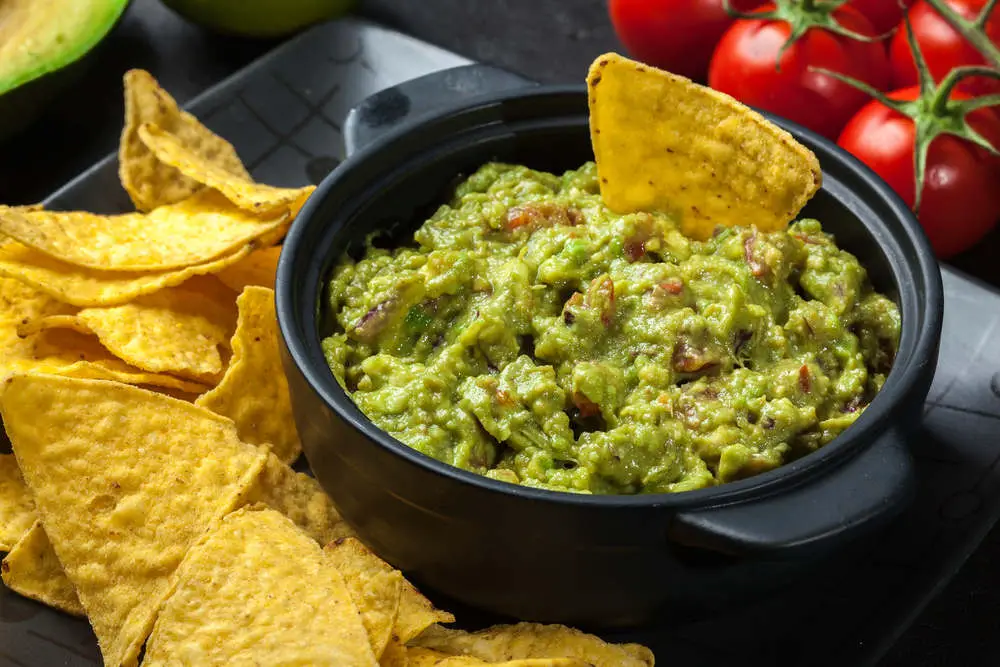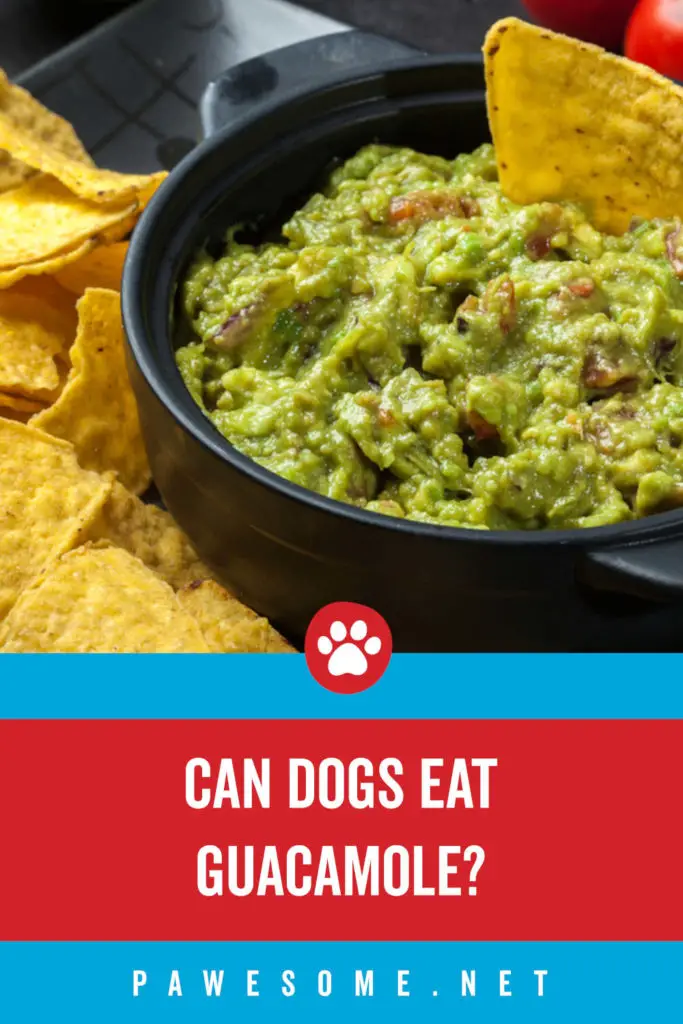
Guacamole is a popular dip made from mashed avocado, tomatoes, onions, and other ingredients. While it’s a delicious and healthy snack for humans, many pet owners wonder if it’s safe for their furry friends to eat. Can dogs eat guacamole? The answer is not straightforward.
Avocado, the main ingredient in guacamole, is not toxic to dogs, but it does contain persin, a substance that can cause stomach upset and other symptoms in some dogs. Additionally, many guacamole recipes contain other ingredients that are harmful to dogs, such as onions, garlic, and salt. Therefore, it’s best to avoid feeding guacamole to your dog, even in small amounts.
In this article, we will explore in detail the question of whether dogs can eat guacamole. We will look at the potential risks and benefits of feeding avocados to dogs, as well as the other ingredients commonly found in guacamole. We will also provide some alternative snacks that are safe and healthy for dogs to eat.
The Risks of Feeding Guacamole to Dogs
Avocado Toxicity in Dogs
While avocados are a popular superfood for humans, they can be toxic to dogs. According to American Kennel Club, avocados contain a toxin called persin, which can cause vomiting and diarrhea in dogs. In severe cases, it can lead to pancreatitis, which is a serious condition that requires immediate medical attention. The flesh of the avocado fruit itself is not as toxic as the leaves, bark, and seeds, but it is still not recommended to feed it to dogs.
It is important to note that the level of toxicity varies depending on the size of the dog and the amount of avocado consumed. Small dogs are more susceptible to the effects of persin, and a large amount of avocado can be fatal to them. Therefore, it is better to err on the side of caution and avoid feeding guacamole to dogs altogether.
Other Ingredients in Guacamole That Are Harmful to Dogs
Aside from the avocado itself, guacamole contains other ingredients that can be harmful to dogs. For example, onions and garlic are commonly used in guacamole recipes, and both of these foods are toxic to dogs. They can cause damage to the red blood cells, leading to anemia and other health problems.
Additionally, guacamole often contains high levels of salt, which can be poisonous to dogs if consumed in large amounts. Salt can cause dehydration, vomiting, diarrhea, and even seizures in dogs. Tomatoes, another common ingredient in guacamole, are not toxic to dogs, but they can cause digestive upset in some dogs.
Overall, it is best to avoid feeding guacamole to dogs. While a small amount of avocado may be safe for some dogs, the potential risks outweigh the benefits. If you want to give your dog a treat, there are plenty of other dog-friendly foods to choose from.
Also Read: Can Dogs Eat Salsa?
Signs and Symptoms of Avocado Poisoning in Dogs
While avocados are not toxic to dogs, the fruit and its pit contain a substance called persin, which can cause gastrointestinal upset and even pancreatitis in some dogs. Here are some signs and symptoms of avocado poisoning in dogs:
- Vomiting
- Diarrhea
- Abdominal discomfort
- Loss of appetite
- Lethargy
- Difficulty breathing
If your dog has ingested any part of an avocado or guacamole, it is important to monitor them closely for any of the above symptoms. In some cases, the symptoms may not appear immediately, but can take up to 24-48 hours to manifest. If you notice any of these symptoms, it is important to contact your veterinarian immediately.
In severe cases, avocado poisoning can lead to pancreatitis, which is inflammation of the pancreas. This condition can be life-threatening if left untreated, and can cause symptoms such as severe abdominal pain, vomiting, and dehydration. If you suspect your dog has pancreatitis, it is important to seek veterinary care right away.
Additionally, if your dog has ingested the pit of an avocado, it can cause stomach or intestinal obstruction, which may require emergency surgery. Symptoms of obstruction can include vomiting, diarrhea, and abdominal pain.
If you suspect your dog has ingested any part of an avocado, it is important to seek veterinary care right away to ensure their health and safety.
What to Do If Your Dog Eats Guacamole
Guacamole is a delicious dip that many people enjoy. However, it is important to remember that it contains avocados, which can be toxic to dogs in large quantities. If your dog has eaten guacamole, here’s what you should do:
When to Call the Vet
If your dog has only had a small amount of guacamole, they may not experience any adverse effects. However, if your dog has eaten a large amount of guacamole or is showing signs of illness, it is important to call your vet right away. Symptoms of avocado poisoning in dogs include vomiting, diarrhea, lethargy, difficulty breathing, and even death in severe cases.
Treatment Options for Avocado Poisoning in Dogs
If your dog has eaten a large amount of guacamole or is showing signs of avocado poisoning, your vet may recommend treatment options such as IV fluids, anti-nausea medication, and supportive care. In severe cases, hospitalization may be necessary.
Remember, prevention is key when it comes to keeping your dog safe from avocados and guacamole. Keep these foods out of reach of your dog, and if you suspect your dog has eaten them, seek veterinary care immediately.
Healthy Alternatives to Guacamole for Dogs
Guacamole is a delicious and healthy snack for humans, but it is not safe for dogs. However, there are many healthy alternatives to guacamole that your furry friend can enjoy. Here are a few options:
- Carrot and Peas: Carrots and peas are both safe and healthy for dogs. You can steam them and mash them together to create a tasty and nutritious snack.
- Mashed Bananas: Bananas are a great source of potassium and other nutrients that dogs need. Mash them up and serve them to your dog as a treat.
- Mashed Sweet Potatoes: Sweet potatoes are a great source of fiber and other nutrients that dogs need. Mash them up and serve them to your dog as a treat.
Remember to always check with your veterinarian before introducing any new foods to your dog’s diet. Some dogs may have allergies or sensitivities to certain foods, so it’s important to make sure that any new foods are safe for your furry friend.
Also Read: Can Dogs Eat Tamales?
Final Thoughts
While guacamole is a delicious and nutritious snack for humans, it is not safe for dogs due to the presence of avocados and other potentially harmful ingredients, such as onions, garlic, and salt. Avocado toxicity can cause a range of symptoms in dogs, from gastrointestinal upset to more severe complications like pancreatitis.
It is essential to monitor your dog closely if they have ingested any part of an avocado or guacamole and seek veterinary care immediately if they exhibit any signs of poisoning. Prevention is key, so be sure to keep avocados and guacamole out of reach of your pets.

